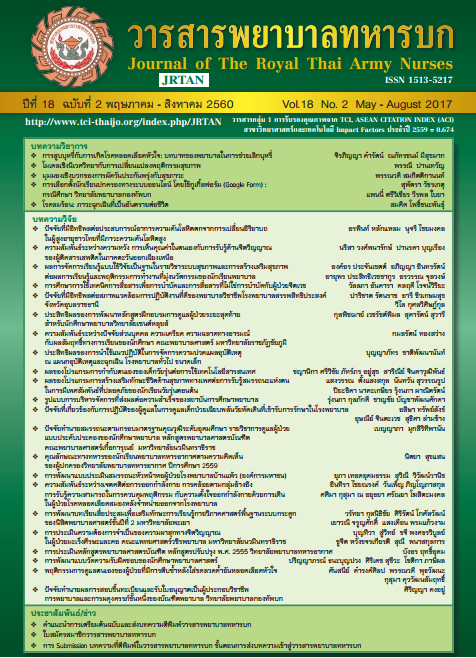รูปแบบการบริหารจัดการที่ส่งผลต่อความสำเร็จของ สถาบันการศึกษาพยาบาล
Keywords:
ความสำเร็จของสถาบัน, การบริหารจัดการ, คุณลักษณะผู้นำ, สถาบันการศึกษาพยาบาล, success in the institute, management, leadership qualification, institute of nursing educationAbstract
การวิจัยเชิงพรรณนานี้เป็นการวิจัยเชิงปริมาณและคุณภาพ มีวัตถุประสงค์เพื่อ (1) วิเคราะห์หาความสัมพันธ์เชิงสาเหตุ ที่เกี่ยวข้องระหว่างคุณลักษณะผู้นำและการบริหารจัดการสถาบันที่ส่งผลต่อความสำเร็จของสถาบันการศึกษาพยาบาล และ (2) กำหนดรูปแบบการบริหารจัดการที่ส่งผลต่อความสำเร็จของสถาบันการศึกษาพยาบาล กลุ่มตัวอย่างคณบดี/ผู้อำนวยการและ อาจารย์พยาบาลปฏิบัติหน้าที่บริหารงานของสถาบันการศึกษาพยาบาลในการวิจัยเชิงปริมาณ จำนวน 365 คน และการวิจัย เชิงคุณภาพ จำนวน 15คน เครื่องมือที่ใช้คือแบบสอบถามและแบบสัมภาษณ์ใช้สถิติเชิงพรรณนาได้แก่ค่าความถี่ร้อยละค่าเฉลี่ย เลขคณิต ส่วนเบี่ยงเบนมาตรฐาน และสถิติทดสอบสมมติฐาน ได้แก่ สถิติวิเคราะห์เส้นทางอิทธิพล (path analysis) สถิติการ วิเคราะห์โมเดลสมการโครงสร้าง (structural equation modeling : SEM) และการวิเคราะห์เชิงเนื้อหา (content analysis) ผลการวิจัยพบว่า คุณลักษณะผู้นำของผู้บริหารมีอิทธิพลทางตรงกับการบริหารจัดการ (DE = 1.18) และคุณลักษณะ ผู้นำของผู้บริหารมีอิทธิพลทางตรงและทางอ้อมกับความสำเร็จของสถาบันการศึกษาพยาบาล (DE =-.52, IE = 1.67) ส่วนการ บริหารจัดการมีอิทธิพลทางตรงกับความสำเร็จของสถาบันการศึกษาพยาบาล(DE = 1.42)และโมเดลสมการโครงสร้างความสัมพันธ์ เชิงสาเหตุที่เกี่ยวข้องระหว่างคุณลักษณะผู้นำของผู้บริหารและการบริหารจัดการที่ส่งผลต่อความสำเร็จของสถาบันการศึกษา พยาบาลที่พัฒนาขึ้นมีความสอดคล้องกับข้อมูลเชิงประจักษ์(χ2 = 5.909, df = 6,P = .433, CMIN/df = .985, GFI = .996,AGFI = .976, RMSEA = .000) ซึ่งสามารถอธิบายผลสำเร็จของสถาบันการศึกษาพยาบาลได้ร้อยละ 54.10 ผลการวิจัยเชิงคุณภาพ สอดคล้องกับเชิงปริมาณในทุกมิติและเสนอแนะให้พัฒนาคุณลักษณะผู้นำของผู้บริหารที่เอื้อต่อความสำเร็จของสถาบันการศึกษา พยาบาล รวมทั้งการรวมกลุ่มกันเป็นเครือข่ายเพื่อพัฒนาศักยภาพและกำหนดทิศทางการพัฒนาร่วมกันในการเสริมสร้างความ แข็งแกร่งและความได้เปรียบในการแข่งขันให้กับสถาบันการศึกษาพยาบาล
Model of Management that Affect the Success in the Institute of Nursing Education
This descriptive research is quantitative and qualitative research aimed to (1) analyze the causal relationship between leadership qualifications and management that affect the success in the institute of nursing education and (2) create a model of management that affect the success in the institute of nursing education. The samples of the deans/directors and nursing Instructors perform administrative duties in the institute of nursing education were 365 in quantitative research and 15 in qualitative research. The research instruments were questionnaires and interviews.The descriptivestatisticsused intheresearch werefrequency, percentage, arithmetic mean and standard deviation. The statistics of hypothesis tests were path analysis, structural equation modeling (SEM) and content analysis. The finding found that the leadership qualifications had direct effect on management. (DE =1.18) and the leadership qualifications had direct and indirect effect on the success in the institute of nursing education (DE = -.52, IE = 1.67). The management had direct effect on the success in the institute of nursing education (DE=1.42) and the developed structural equation model had congruence with the empirical data, (χ2 = 5.909, df = 6, P = .433, CMIN/df = .985, GFI = .996, AGFI = .976, RMSEA = .000) was able to explain 54.10 percent of the success in the institute of nursing education. The qualitative results were consistent with all quantitative dimensions and suggested to develop leadership qualifications of the executives contributing to the success in the institute of nursing education. As well as being a network to develop the potential and determine the direction for joint development in strengthening the strength and competitive advantage of nursing education institutions
Downloads
Downloads
How to Cite
Issue
Section
License
บทความหรือข้อคิดเห็นใดใดที่ปรากฏในวารสารพยาบาลทหารบกเป็นวรรณกรรมของผู้เขียน ซึ่งบรรณาธิการหรือสมาคมพยาบาลทหารบก ไม่จำเป็นต้องเห็นด้วย
บทความที่ได้รับการตีพิมพ์เป็นลิขสิทธิ์ของวารสารพยาบาลทหารบก
The ideas and opinions expressed in the Journal of The Royal Thai Army Nurses are those of the authors and not necessarily those
of the editor or Royal Thai Army Nurses Association.






